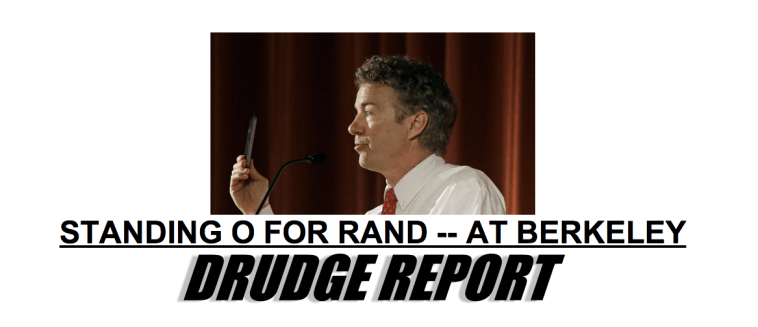“Rand Paul panders at Berkeley,” read the Washington Post headline by neoconservative columnist Jennifer Rubin, blasting the senator for his recent speech at the liberal university.
Videos By Rare
Daily Caller editor and Rare contributor Jim Antle Tweeted Rubin’s column, mocking, “A politician who gives substantially the same speech at CPAC and Berkeley is pandering, obviously.”
Antle makes an important point.
https://twitter.com/jimantle/status/446773436632014848
If Paul went to liberal Berkeley to blast the National Security Agency and defend the Bill of Rights he essentially did the same thing at the Conservative Political Action Conference two weeks prior. Before a very liberal crowd and a very conservative crowd Paul delivered the same pro-civil liberties message and got the same reaction—standing ovations.
Similar to Rubin, Bill Clinton’s former labor secretary Robert Reich also dismissed Paul’s Berkley speech as pandering via his Facebook page: “Berkeley wouldn’t have been so welcoming had he mentioned his opposition to abortion even if a woman’s life is at stake, or his negative view of gay marriage. He’s a libertarian only when convenient.”
Rubin mimicked Reich, “(Paul) is trying to pull a fast one on students, concealing his views on a majority of issues while trying to snag them with some anti-government trinkets on national security.”
The liberal Reich said, “Paul has the superficially pleasing demeanor of a velvet glove fit firmly around a right-wing extremist’s iron fist.” While Rubin warned that Paul is “running to Obama’s left and stoking paranoia about national security, is unlikely to please conservative primary voters.”
But Paul’s pro-civil liberties message would please conservative primary voters. A lot. It will also please independents, some of which vote in Republican primaries. It will also likely please some progressives who’ve been known to support libertarian-leaning Republicans in the past.
Who Rand Paul’s civil liberties outreach won’t please is people like Jennifer Rubin and Robert Reich.
The same young people who rejected Bush and his legacy in 2008 are now also pretty fed up with Obama, particularly regarding this administration’s poor civil liberties record. Some have even called Paul a better liberal “hero” on these issues than any Democrat.
Conservatives now fear a government and a president that has the power and authority to spy on their every move. 78 percent of participants in the year’s CPAC survey said they opposed the NSA’s metadata collection program.
Who is in favor of allowing the federal government to have such unrestrained power over citizens? Republicans who still think Bush-Cheney was a rousing success, though most Americans would disagree, and Obama apologists who now don’t mind Big Brother so long as it’s a Democrat.
Robert Reich dismissing Paul as a rightwing extremist might work with some of these Democrats, but not necessarily young progressives. Rubin can call Paul’s pro-civil liberties views to the “left of Obama,” but her pandering to conservative identity doesn’t resonate with today’s conservatives, many of who sympathize with Paul far more than they do Rubin’s neoconservative worldview.
While Reich and Rubin are irritated at Paul for breaking down party lines on civil liberties, some have noticed that this approach is exactly what the Republican Party needs. Writing at The Transom, Ben Domenech says, “Paul’s Berkeley event – as much as his events in other supposedly unfriendly venues – is an example of how he’s making a pitch for people to identify him with specific issues (typically based in distrust of government) that cut across traditional coalition lines. It’s also an example of how he’s trying to do something very different than traditional Republican candidacies in the modern era.”
Domenech adds, “Paul’s message has the ability to puncture typical biases against any politician with an R after their name with constituencies who Republicans have traditionally ignored.”
For the Republican Party to grow, it will obviously have to move beyond just its current base, something that will inevitably defy conventional partisanship. After Paul’s Berkley speech, former senator and GOP presidential candidate Rick Santorum tried the same trick as Rubin, “I see the Rand Paul wing of the Republican Party for what it is: allied with Barack Obama’s foreign policy.”
But how many conservatives are actually buying into these partisan digs? Who is more ascendant as an impact player in Republican politics at the moment—Rand Paul or Rick Santorum?
Rand Paul is blurring party lines right now. It’s the only way to expand them.
Disclosure: I co-authored Senator Rand Paul’s 2011 book The Tea Party Goes to Washington

